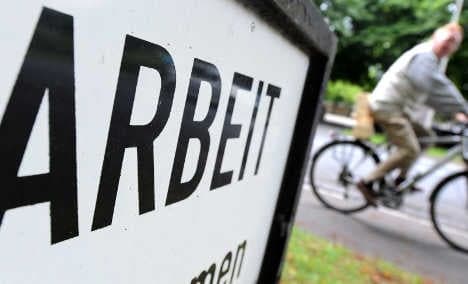Germany predicts record number of jobs

Germany said on Wednesday its robust economy would fuel record employment this year and next as well as boost consumer spending and industrial investment.
Unemployment is set to hit 6.9 percent this year and fall to 6.8 percent in 2014 - far below the 12 percent reported by the crisis-hit eurozone, according to the German Economy Ministry's autumn forecast.
The report said that the economy would add 235,000 jobs this year
and another 180,000 next year.
"The German economy is again on a stable course for growth," outgoing Economy Minister Philipp Rösler told reporters.
"The foundations of this growth are economic forces at home: the mood of German companies is good, they are again investing more in equipment and construction. Employment and income are growing significantly and bolstering private consumption," he said.
Disposable income for German households is due to jump 2.1 percent and 2.9 percent in 2014, which Rösler said was expected to spur consumer spending.
The economy ministry predicts Gross Domestic Product (GDP) will expand 0.5 percent this year and 1.7 percent next year, confirming reports from sources on Tuesday and underlining the rude health of Europe's top economic power.
Rösler is due to be replaced following a general election last month that saw his Free Democrats ousted from parliament for the first time since their founding after World War Two.
Chancellor Angela Merkel's conservative Christian Democrats joined the second biggest German party, the Social Democrats, for the formal start of coalition negotiations Wednesday, which they hope to wrap up by Christmas.
READ MORE: Dairy prices up by 32 percent in a year
AFP/kkf
Follow us on Twitter @thelocalgermany
Like The Local Germany on Facebook
Comments
See Also
Unemployment is set to hit 6.9 percent this year and fall to 6.8 percent in 2014 - far below the 12 percent reported by the crisis-hit eurozone, according to the German Economy Ministry's autumn forecast.
The report said that the economy would add 235,000 jobs this year
and another 180,000 next year.
"The German economy is again on a stable course for growth," outgoing Economy Minister Philipp Rösler told reporters.
"The foundations of this growth are economic forces at home: the mood of German companies is good, they are again investing more in equipment and construction. Employment and income are growing significantly and bolstering private consumption," he said.
Disposable income for German households is due to jump 2.1 percent and 2.9 percent in 2014, which Rösler said was expected to spur consumer spending.
The economy ministry predicts Gross Domestic Product (GDP) will expand 0.5 percent this year and 1.7 percent next year, confirming reports from sources on Tuesday and underlining the rude health of Europe's top economic power.
Rösler is due to be replaced following a general election last month that saw his Free Democrats ousted from parliament for the first time since their founding after World War Two.
Chancellor Angela Merkel's conservative Christian Democrats joined the second biggest German party, the Social Democrats, for the formal start of coalition negotiations Wednesday, which they hope to wrap up by Christmas.
READ MORE: Dairy prices up by 32 percent in a year
AFP/kkf
Follow us on Twitter @thelocalgermany
Like The Local Germany on Facebook
Join the conversation in our comments section below. Share your own views and experience and if you have a question or suggestion for our journalists then email us at [email protected].
Please keep comments civil, constructive and on topic – and make sure to read our terms of use before getting involved.
Please log in here to leave a comment.